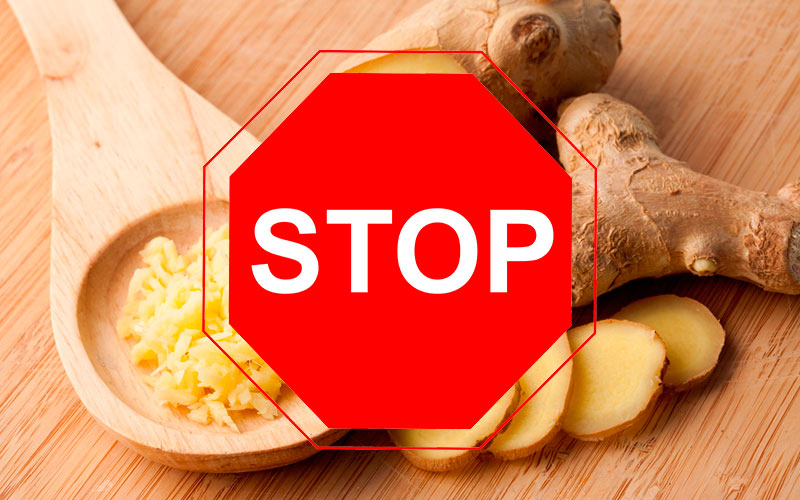Be careful when using ginger!

Ginger (Latin Zingiber) - a genus of perennial herbaceous plants from the family of ginger (Zingiberaceae), as well as spice, raw or processed rhizomes of ginger pharmacy.
Everyone knows ginger, can become a terrible health threat in combination with anticoagulants, beta-blockers, and insulin on the basis of medicines, besides it is harmful to pregnant women and that's not all ...
 Name
Name
It is believed that the scientific name came from singabera, which in Sanskrit means "horned root". According to Fasmer, the Russian word is borrowed from German (perhaps through Polish mediation). Even in the XIX century in Russian, the most common form of the word was "ginger". The people also called it the "white root".
 Meaning and application
Meaning and application
Some species are used as medicinal plants. The rhizomes of ginger pharmacy (Zingiber officinale) are known as spices, widely used in cooking and being used for medical purposes.
 Production
Production
Depending on the method of preliminary preparation, there are two types of ginger:
- White ginger is a pre-washed ginger, peeled from a superficial, denser layer;
- Black ginger - not pre-treated.
Both species are dried in the sun. Black ginger as a result gets a stronger smell and more burning taste. At the break, ginger is light yellow regardless of the species. The flesh of young rhizomes is almost white; The older the rhizome, the yellower it is at the break.
 Chemical composition
Chemical composition
The content of essential oil in dry rhizomes is 1.5-3%, its main component is zingiberen (zingiberian) - sesquiterpenes (group of organic compounds of terpenes) up to 70%, and also contains camphene, cineole, bisabolene, borneol, citral, linalool. Ginger also contains vitamins C, B1, B2 and essential amino acids. The burning taste is due to the substance gingerolruen.
 Application
Application
Most often, ginger is used in the ground form. Ground spice is a grayish-yellow powdery powder. If it has a strong and persistent flavor, it is considered better.
The healing properties of ginger are extremely useful for the treatment of many diseases, including:
- Relieves pain in joints
- Strengthens the immune system,
- Relieves the symptoms of nausea, migraine, and coughing
- Reduces digestive problems, such as diarrhea, convulsions, belching, constipation and hemorrhoids
- Improves blood circulation and prevents the formation of blood clots
- Reduces the level of sugar and cholesterol in the blood
- Prevents the growth of cancer cells
- Removes toxins from the body, etc.
Due to its antiseptic properties, ginger has long been used to treat various health problems. As a rule, it is considered a universal natural remedy, because its health benefits can greatly alleviate many health conditions.
However, ginger treatment is not recommended for everyone . If you belong to any of these groups, you should avoid eating ginger:
Pregnant women
Ginger is rich in powerful stimulants, which can provoke premature birth. Pregnant women should avoid ginger at all costs, especially in the last trimester of pregnancy.
People who want to gain weight
Ginger, as is known, is very useful for those who are trying to lose weight, as it gives a feeling of satiety and promotes fat burning. If you want to gain weight, ginger can only give you the opposite effect, so you better forget about it.
People with diseases of the blood
Ginger improves blood circulation, which is usually useful, except for those who suffer from blood diseases, such as hemophilia.
People who take high-pressure medicines and suffer from diabetes
Ginger can interact with drugs, especially anticoagulants, beta-blockers and insulin-based drugs. So, if you are taking any medicine for high blood pressure or diabetes, you should stay away from this plant, because there is a serious risk that it will inhibit the effects of your medications.
Via fithacker.ru & wiki


Comments
When commenting on, remember that the content and tone of your message can hurt the feelings of real people, show respect and tolerance to your interlocutors even if you do not share their opinion, your behavior in the conditions of freedom of expression and anonymity provided by the Internet, changes Not only virtual, but also the real world. All comments are hidden from the index, spam is controlled.